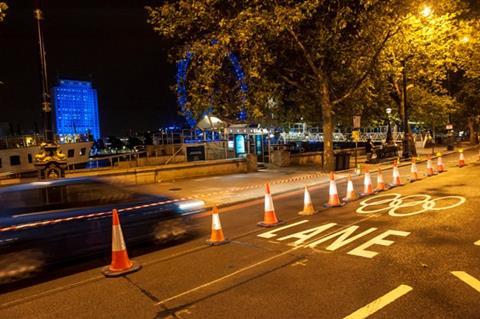
The London Olympics may be a happy memory for most, but it appears the freight industry’s “legacy” is far from assured.
While it is true that the Games successfully pushed freight’s needs onto the political radar at the traditionally people and passenger focused Transport for London (TfL), not everyone it seems is so willing to step into the golden afterglow of last year’s blockbuster competition.
The launch of the London mayor Boris Johnson-backed Roads Task Force (RTF) report last week brought plenty of ambition, including some outlandish suggestions such as toll road tunnels under the capital, roofing over arterial roads to create urban space and airships. Okay, not airships.
Still, at a cost of £30bn over 20 years it’s certain that many of these suggestions

won’t go any further (although perhaps airships are simply an idea waiting to be floated). However, not least because it complements Johnson’s own stated cycling policy, there is political will to make several recommendations happen, such as additional cycling uptake in the city. And what happens in London...
Taking a step back, the Road Haulage Association welcomed the fact that the report and TFL’s subsequent response acknowledged that money needs to be spent on the capital’s road network – indeed TfL has confirmed £4b is ready to be used for exactly this.
But, back on the bike theme, the RTF is unabashed in its stated report aim of “transforming conditions for walking, cycling and public transport” in the capital. Yes, there is acknowledgement that deliveries will need to be made to London’s expected 10 million residents by 2031 (as everyone presumably would like to eat and have goods and services), but there is also a call to change the way goods and services are delivered.
Rather than a beautiful image of airships floating over the Thames, this leaves you with the impression that freight could be marginalised in this new vision, with its vital role remaining an inconvenient truth.
Feeling peaky
“Shifting LGVs and freight out of peak hours as seen during the London 2012 Games and switching deliveries to vans, biked or powered vehicles”, is unsurprisingly one of the action points put forward by the RTF [the report states a quarter of peak traffic in London, defined as between 7am to 10am, already consists of cyclists, so this would improve cycle road safety too].

To its credit, TfL has said that it will continue to build on its relationship developed during the Olympics with the freight industry and work with it to introduce greater delivery flexibility for the benefit of all. Simply banning LGVs from the rush hour doesn’t appear to be on the cards. Just yet.
TfL will be conducting more out of hours trials in the next months, as it builds a body of evidence to show that more flexible working within the logistics sector doesn’t have to result in an onerous impact on London residents.
But for road transport there remains a capacity issue to be addressed as part of this new vision, especially if peak time is to be avoided. Freight operators, as the FTA’s Natalie Chapman pointed out, don’t choose to operate in the rush hour. They are forced into the morning peak, for example, as a consequence of a range of curfews and delivery restrictions in place via borough councils.
Councils, lots of councils
This brings us to the inevitable white elephant in the room, symbolised during the Olympics by the London boroughs' intransigence in relaxing the London Lorry Control Scheme (LLCS): London’s councils are their own masters and their councillors are elected by residents that have very fixed views on freight and especially out of hours deliveries – namely “get rid of the trucks” and "no way".

In the wake of the report, the FTA called for a more flexible approach to deliveries from London’s councils with both it and the Brewery Logistics Group suggesting a review of the long-standing LCCS would encapsulate the spirit of co-operation RTF’s ambitions require.
Not unreasonable against the backdrop of forecast population growth by 1.7 million people to 10 million by 2031.
“More deliveries outside current peak times may help reduce congestion,” said a spokeswoman for London Councils, which administers the LCCS for London’s 33 borough councils, in response. “[However] there are a number of challenges to increasing out of hours deliveries. These include large supermarkets which require regularly spaced deliveries throughout the day and small and medium sized businesses which cannot afford to staff up out of hours. Environmental intrusion will also be an issue in some locations.
“The LLCS does not restrict out of hours deliveries and while the scheme may be changed for other reasons, a review is not essential to meet the RTF objectives.”
Not exactly a promising start, especially given the Games legacy for freight was supposed to be an inclusive relationship with the powers that be. On a side note, last year London Councils awarded a contract to NSL to manage on-street enforcement of the LLCS. Appointment of the third party enforcement firm is likely to lead to more PCNs issued under the scheme (NSL does not work for free after all), and at The £550 for operators and £120 for drivers - reduced by 50% if paid within 14 days - that's going to hurt.
On the second point The Brewery Logistics Group’s chairman Mike Bracey is of the view that “the statement that the LLCS does not restrict out of hours deliveries is not true, as by restricting vehicles to the Excluded Route Network the LLCS makes them take some very large detours to effect their deliveries, which makes it financially unattractive.”
Long battle ahead
Even Peter Hendy, TFL’s commissioner fresh from his Olympic success [delivering not participating], was sanguine when speaking to motortransport.co.uk at the launch of the RTF report last week.
“It is difficult for the local authorities as they are elected by residents that simply say no to out of hours deliveries. We’ll be reestablishing out of hours trials in some difficult places to demonstrate what the industry can do, and ultimately help freight operators be more efficient,” he said.
Hendy added that a full-frontal assault on the boroughs and the LLCS would likely fail, adding there is still much groundwork to be laid. “I think in the medium-term we could have a conversation,” he said.
In a city as fast moving [bar the congested roads] as London, that seems an awfully long time.










